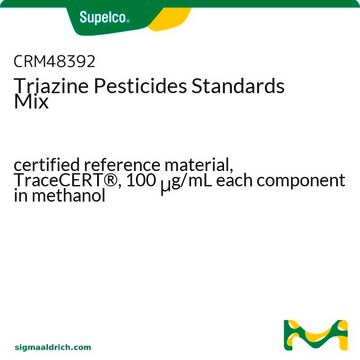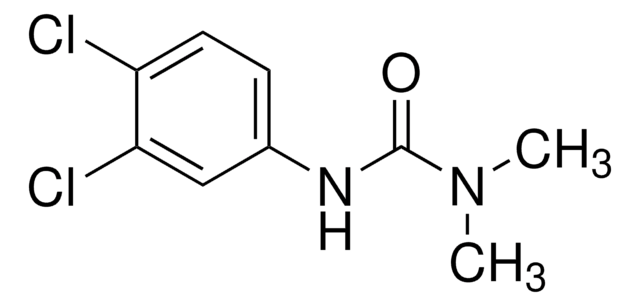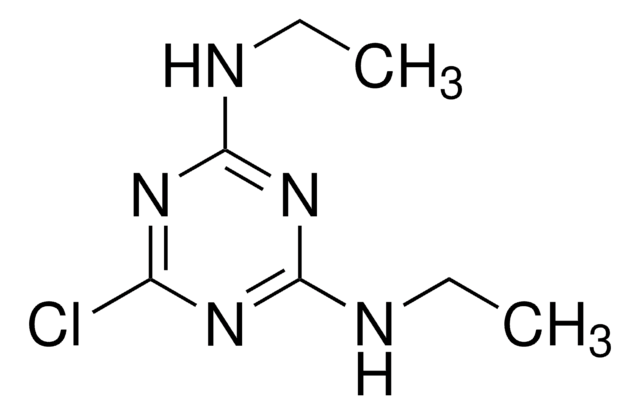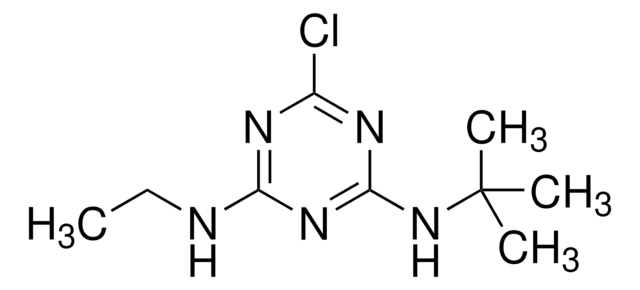All Photos(1)
About This Item
Empirical Formula (Hill Notation):
C10H19N5S
CAS Number:
Molecular Weight:
241.36
Beilstein:
611817
EC Number:
MDL number:
UNSPSC Code:
41116107
PubChem Substance ID:
NACRES:
NA.24
Recommended Products
grade
analytical standard
Quality Level
product line
PESTANAL®
shelf life
limited shelf life, expiry date on the label
technique(s)
HPLC: suitable
gas chromatography (GC): suitable
application(s)
agriculture
environmental
format
neat
SMILES string
CCNc1nc(NC(C)(C)C)nc(SC)n1
InChI
1S/C10H19N5S/c1-6-11-7-12-8(15-10(2,3)4)14-9(13-7)16-5/h6H2,1-5H3,(H2,11,12,13,14,15)
InChI key
IROINLKCQGIITA-UHFFFAOYSA-N
Looking for similar products? Visit Product Comparison Guide
General description
Terbutryn is primarily used to control a wide variety of annual grass and broadleaf weed species. This preemergence and postemergence s-triazine herbicide inhibits root development by interrupting mitosis.
Application
Refer to the product′s Certificate of Analysis for more information on a suitable instrument technique. Contact Technical Service for further support.
Terbutryn may be used as a reference standard for the determination of terbutryn in wastewater and soil by micellar liquid chromatography.
Legal Information
PESTANAL is a registered trademark of Merck KGaA, Darmstadt, Germany
Signal Word
Warning
Hazard Statements
Precautionary Statements
Hazard Classifications
Aquatic Acute 1 - Aquatic Chronic 1
Storage Class Code
11 - Combustible Solids
WGK
WGK 2
Flash Point(F)
Not applicable
Flash Point(C)
Not applicable
Personal Protective Equipment
dust mask type N95 (US), Eyeshields, Gloves
Choose from one of the most recent versions:
Already Own This Product?
Find documentation for the products that you have recently purchased in the Document Library.
Customers Also Viewed
Determination of diuron, terbuthylazine, and terbutryn in wastewater and soil by micellar liquid chromatography.
Pitarch-Andres S, et al.
Analytical and Bioanalytical Chemistry, 409(8), 2037-2049 (2017)
In vitro testing for genotoxicity of the herbicide terbutryn: cytogenetic and primary DNA damage.
Moretti M, et al.
Toxicology in vitro, 16(1), 81-88 (2002)
Effect of Pendimethalin, Trifluralin and Terbutryn on Lolium multiflorum growing with barley during pre-emergence stage.
Alshallash KS.
Annals of Agricultural Science, 59(2), 239-242 (2014)
Matthias Broser et al.
The Journal of biological chemistry, 286(18), 15964-15972 (2011-03-04)
Herbicides that target photosystem II (PSII) compete with the native electron acceptor plastoquinone for binding at the Q(B) site in the D1 subunit and thus block the electron transfer from Q(A) to Q(B). Here, we present the first crystal structure
Kristin Quednow et al.
Environmental science and pollution research international, 16(6), 630-640 (2009-05-23)
The present study focuses on the temporal concentration changes of four common organic pollutants in small freshwater streams of Hesse, Germany. The substances (tris(2-chloroethyl)phosphate (TCEP), the technical isomer mixture of 4-nonylphenol (NP), 2-(t-butylamino)-4-(ethylamino)-6-(methylthio)-s-triazine (terbutryn), and N,N-diethyl-m-toluamide (DEET)) are subject to
Our team of scientists has experience in all areas of research including Life Science, Material Science, Chemical Synthesis, Chromatography, Analytical and many others.
Contact Technical Service













